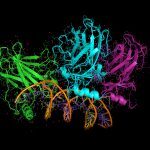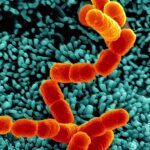Lien vers Pubmed [PMID] – 31085703
Lien DOI – e00005-1910.1128/IAI.00005-19
Infect Immun 2019 08; 87(8):
Clostridium difficile is the leading cause of antibiotic-associated diarrhea in adults. During infection, C. difficile must detect the host environment and induce an appropriate survival strategy. Signal transduction networks involving serine/threonine kinases (STKs) play key roles in adaptation, as they regulate numerous physiological processes. PrkC of C. difficile is an STK with two PASTA domains. We showed that PrkC is membrane associated and is found at the septum. We observed that deletion of prkC affects cell morphology with an increase in mean size, cell length heterogeneity, and presence of abnormal septa. A ΔprkC mutant was able to sporulate and germinate but was less motile and formed more biofilm than the wild-type strain. Moreover, a ΔprkC mutant was more sensitive to antimicrobial compounds that target the cell envelope, such as the secondary bile salt deoxycholate, cephalosporins, cationic antimicrobial peptides, and lysozyme. This increased susceptibility was not associated with differences in peptidoglycan or polysaccharide II composition. However, the ΔprkC mutant had less peptidoglycan and released more polysaccharide II into the supernatant. A proteomic analysis showed that the majority of C. difficile proteins associated with the cell wall were less abundant in the ΔprkC mutant than the wild-type strain. Finally, in a hamster model of infection, the ΔprkC mutant had a colonization delay that did not significantly affect overall virulence.






